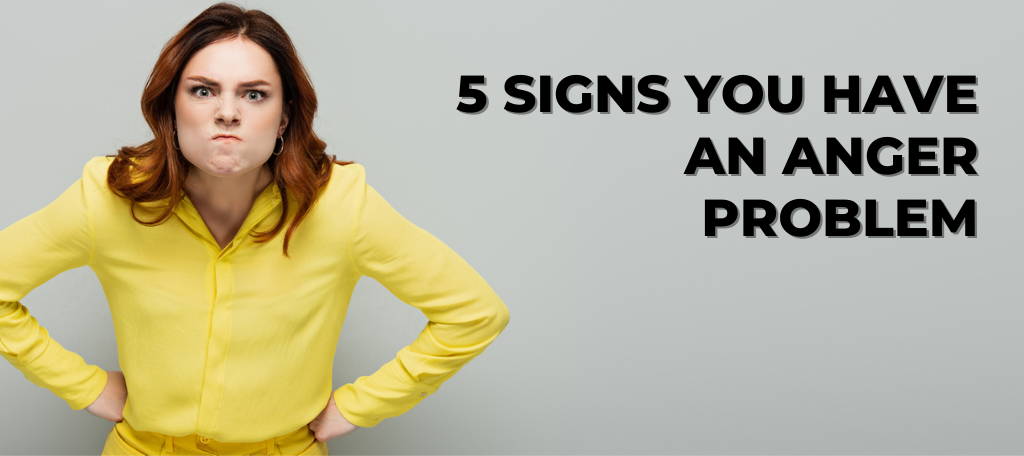We all have times that we have anger and lash out. Experts say it’s even healthy to vent your anger from time to time. It can also shield us from other people trying to hurt us or someone else.
The problems start when you let your anger get out of hand.
Rampant anger makes you feel like you’re losing control, almost like you’re not yourself. It’s not the best feeling in the world. It often takes its toll on your health, your relationships, as well as your career. It can even get you in trouble with the law.
If you think you’re suffering from a hidden anger problem, you’ve come to the right place. Recognition is an essential part of solving any problem. Being aware of your anger issues means you’ve taken the first step towards positive change.
In this article, we’ll talk about five signs you have an anger problem. We’ll also discuss the difference between healthy and unhealthy feelings of anger. Once you see the difference, you can control your emotions rather than the other way around.
Let’s get started!
Healthy vs. Unhealthy Anger
Before we talk about different types of anger, we need to learn how to recognize your anger. You should also know what sets it off. Start by asking yourself these questions:
- What situations/events/places/people make me angry?
- How can I tell when I’m angry?
- How do I react when I’m angry?
- How does my anger affect those around me?
Healthy Anger
Healthy anger is an automatic signal that lights up when we sense that something isn’t right. If you see someone being hurt or mistreated, your anger acts as a catalyst. So, you immediately start thinking of ways to help.
Dr. Robert M. Fraum, Ph.D., says, “Healthy anger is deliberate, proportional, and responsive to a clear and present need. [it’s] a powerful tool of human survival and adaptation.”
Unhealthy Anger
On the other hand, unhealthy anger hurts everyone around instead of helping. Remember, if you experience one or more of these behaviors from time to time, it doesn’t mean you have an anger problem. The problem intensifies according to the frequency of these behaviors and their consequences.
The following are a few ways unhealthy anger can manifest itself in several ways, such as:
- Rage
- Resentment
- Manipulation
- Judgment
- Passive aggression
- Verbal or physical abuse
5 Signs You Have an Anger Problem
If you’re worried about whether your anger levels are unhealthy or not, keep reading. You’ll find five of the most common signs of having an anger management issue.
1. You Get into Arguments
We’re not talking about casual arguments you have with your partner or co-worker. We’re talking frequent, overblown rows with everyone you encounter, even strangers.
Not only that, but you feel that you have to win every single argument. Not being able to back down from an argument has nothing to do with what you’re arguing about. But it has everything to do with being more domineering and in control.
If these arguments seem to come out of nowhere and quickly spin out of control, that’s a sign your anger has turned into a problem.
2. You’re Passive Aggressive
People often don’t relate passive aggressiveness with anger. It’s neither loud nor violent.
Yet, it’s one of the most telling signs of anger management issues. The problem is that you may not even realize you’re passive-aggressive. Not only that, but you may not even know you’re angry.
One reason is that when you’re passive-aggressive, your emotions give the impression that you’re in control. For example, you avoid conflict, you’re often sarcastic or indifferent.
3. You Blame Others
Blaming other people for your problems is easier than having to deal with them yourself. While you may do this unknowingly, it’s usually a sign you’re not dealing with your own; that’s also a sign of trouble.
Another sign of an anger problem is that you hold on to resentment. You stay bitter and can’t seem to forgive even over the small stuff.
4. Your Anger Causes Others to Fear You
If you usually react when you’re angry, people start to avoid you whenever they get the chance. They become fearful of you and your over-the-top reactions when you’re mad.
You may notice that when people talk to you, they never come too close. They may also stand with their arms crossed over their chest or have one foot turned to face the door. This is their way of expressing their fear and anxiety when they’re around you.
5. You Worry About Your Reactions
This is both good and bad news. The bad news is that once you’ve reached this stage, it’s more than likely that you have an anger problem.
The good news is you’re starting to acknowledge that you have a problem and you’re worried about your behavior. This is the first step to working through your anger issues and gaining control over your emotions.
A Final Note
If you notice yourself in one or more of these five signs, it means you have a problem. Admitting it is the first step.
The next step is to seek help. Remember, anger is nothing to be ashamed or embarrassed about. But it could result in seriously damaging your life or hurting you or someone you love. The sooner you get the help you need, the sooner you’ll be able to live a healthier, more fulfilling life.
Do take a quiz to find out if you have an anger problem, click here.




